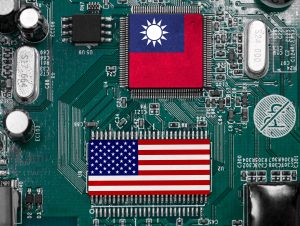Former President Donald Trump recently characterized Taiwan-U.S. relations as a mere “insurance policy” and claimed that Taiwan “took 100 percent of our chip business.” His comments epitomize a transactional view of international alliances.
Such assertions, however, risk oversimplifying the complex realities of the global semiconductor industry and fail to grasp the strategic depth of Taiwan-U.S. interdependence in critical technologies. Far from being a detrimental, one-sided relationship, this partnership is greatly beneficial to the United States, having proven to be economically wise, strategically advantageous, and geographically sound.
Taiwan’s dominance in chip manufacturing aligns with and supports U.S. interests, given their complementary strengths: Taiwan excels in the manufacturing sector, while U.S. companies lead in chip design. This synergy helps promote both efficiency and innovation, as illustrated in the partnership between Nvidia, a U.S. chip designer of high-end graphics processing units (GPUs), and Taiwan Semiconductor Manufacturing Company (TSMC), Taiwan’s leading semiconductor manufacturer.
As Jon Peddie Research recently reported, Nvidia held approximately 80 percent of the desktop discrete graphics processing unit (GPU) market in the third quarter of 2023 and continued to gain share, reaching 88 percent in the first quarter of 2024. TSMC serves as the biggest, if not the only, production partner for Nvidia’s AI GPUs. And with Nvidia’s next-gen Blackwell AI GPU platform on the horizon, it is reported that the company is now increasing its AI chip investment in TSMC by 25 percent, driven by surging market demand for AI technologies.
The success of Taiwan’s chip industry is thus not just about “taking” business from others. Taiwan’s manufacturing expertise has instead functioned as the backbone ensuring the U.S. supremacy in critical technologies.
Contrary to a rivalry-oriented narrative such as Trump’s, Taiwan’s leading role in producing advanced chips is driven by not so much predatory competition as increasing technological complexity and the need for economies of scale. These factors, as suggested by Project 2049 Institute and US-Taiwan Business Council, have pushed the semiconductor industry to evolve into a highly specialized global network, shaped by the need for enormous capital outlays and constant innovation.
The Taiwan-U.S. symbiotic relationship illustrates probably the finest example of such specialization. The sheer complexity and scale of the chip industry preclude any single entity – be it a corporation or even a nation – from controlling the entire semiconductor lifecycle. The industry is in itself highly collaborative, embedded within an international ecosystem where different regions and firms contribute their unique strengths to the overall semiconductor production process.
In this model of global specialization, Taiwan’s competitive edge lies in its mastery of semiconductor manufacturing. This success story is rooted in persistent dedication and incremental advancements rather than sudden leaps – a result of a four-decade journey marked by both setbacks and breakthroughs.
At a conference in Seoul this July, Konrad Young, TSMC’s former director of research and development, attributed Taiwan’s semiconductor success to several factors. Young emphasized the opportune timing of TSMC’s founding in the 1980s, coinciding with the industry’s shift toward differentiation: integrated device manufacturers (IDMs) began transitioning from manufacturing their own chips to a specialized foundry model. TSMC pioneered the pure-play foundry approach, which aligned with Taiwan’s work culture and leveraged the country’s then-competitive labor costs.
What is even more crucial, Young noted that Taiwan’s semiconductor dominance was built on decades of ecosystem development – a time-intensive process that cannot be easily replicated elsewhere.
All these factors combined may explain the challenges faced by companies trying to establish advanced semiconductor manufacturing capabilities outside of Taiwan, particularly in the United States. During an earnings conference in early 2023, for instance, TSMC executives revealed that establishing a plant in the U.S. is at least four times more expensive than in Taiwan, citing elevated labor costs, complex permitting processes, rigorous regulatory compliance, and escalating living expenses.
Rather than viewing Taiwan’s semiconductor industry as competition, it would be more accurate to see it as a crucial component of a global network that ultimately benefits U.S. technological leadership and economic interests.
The notion that Taiwan’s semiconductor industry operates in isolation from U.S. interests overlooks the reality of global investment and shared benefits in this crucial sector.
TSMC, once again, is neither state-owned nor exclusively Taiwanese-owned, but rather a product of international investment and collaboration. As its 2023 shareholder structure reveals, TSMC is owned by a diverse array of global investors. The largest shareholder, at 20.50 percent, represents ADRs primarily traded on U.S. markets, underscoring the company’s strong ties to the U.S. financial ecosystem. In comparison, the National Development Fund, managed by Taiwan’s Executive Yuan (the country’s highest administrative organ and de facto cabinet), holds only 6.38 percent as the second-largest shareholder, further illustrating the limited extent of direct government ownership.
But Taiwan’s contribution to U.S. interests extends far beyond mere financial considerations to global security. In the realm of advanced semiconductors, Taiwan stands as a linchpin for the free democratic world, not only preserving but actively advancing cutting-edge technology and production capacity. This technological leadership serves as a bulwark against the encroachment of non-democratic regimes in critical industries. In this regard, Taiwan itself acts as a crucial safeguard for both the technological supremacy of the U.S. in emerging fields and global technological freedom more broadly.

































